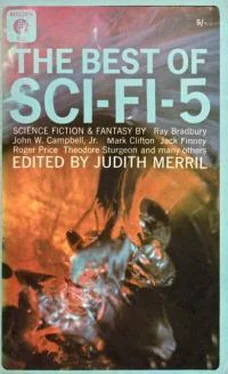The Best of Sci-Fi-5
Здесь есть возможность читать онлайн «The Best of Sci-Fi-5» весь текст электронной книги совершенно бесплатно (целиком полную версию без сокращений). В некоторых случаях можно слушать аудио, скачать через торрент в формате fb2 и присутствует краткое содержание. Год выпуска: 1966, Издательство: Mayflower-Dell, Жанр: Фантастика и фэнтези, на английском языке. Описание произведения, (предисловие) а так же отзывы посетителей доступны на портале библиотеки ЛибКат.
- Название:The Best of Sci-Fi-5
- Автор:
- Издательство:Mayflower-Dell
- Жанр:
- Год:1966
- ISBN:нет данных
- Рейтинг книги:3 / 5. Голосов: 1
-
Избранное:Добавить в избранное
- Отзывы:
-
Ваша оценка:
- 60
- 1
- 2
- 3
- 4
- 5
The Best of Sci-Fi-5: краткое содержание, описание и аннотация
Предлагаем к чтению аннотацию, описание, краткое содержание или предисловие (зависит от того, что написал сам автор книги «The Best of Sci-Fi-5»). Если вы не нашли необходимую информацию о книге — напишите в комментариях, мы постараемся отыскать её.
The Best of Sci-Fi-5 — читать онлайн бесплатно полную книгу (весь текст) целиком
Ниже представлен текст книги, разбитый по страницам. Система сохранения места последней прочитанной страницы, позволяет с удобством читать онлайн бесплатно книгу «The Best of Sci-Fi-5», без необходимости каждый раз заново искать на чём Вы остановились. Поставьте закладку, и сможете в любой момент перейти на страницу, на которой закончили чтение.
Интервал:
Закладка:
In 1947 Rogov had an interview with Stalin. As he left Stalin’s office in the Kremlin, the great leader himself came to the door, his forehead wrinkled in thought, nodding, “Da, da, da.”
Even his own personal staff did not know why Stalin was saying “Yes, yes, yes,” but they did see the orders that went forth marked ONLY BY SAFE HAND, and TO BE READ AND RETURNED, NOT RETAINED, and furthermore stamped FOR AUTHORIZED EYES ONLY AND UNDER NO CIRCUMSTANCES TO BE COPIED.
Into the true and secret Soviet budget that year by the direct personal orders of a noncommittal Stalin, an item was added for “Project Telescope.” Stalin tolerated no inquiry, brooked no comment.
A village which had had a name, became nameless.
A forest which had been opened to the workers and peasants became military territory.
Into the central post office in Kharkov there went a new box number for the village of Ya. Ch.
Rogov and Cherpas, comrades and lovers, scientists both and Russians both, disappeared from the everyday lives of their colleagues. Their faces were no longer seen at scientific meetings. Only rarely did they emerge.
On the few occasions they were seen, usually going to and from Moscow at the time the All Union budget was made up each year, they seemed smiling and happy. But they did not make jokes.
What the outside world did not know was that Stalin in giving them their own project, granting them a paradise restricted to themselves, had seen to it that a snake went with them in the paradise. The snake this time was not one, but two personalities-Gausgofer and Gauck.
Stalin died.
Beria died too - less willingly.
The world went on.
Everything went into the forgotten village of Ya. Ch. and nothing came out.
It was rumored that Khrushchev himself visited Rogov and Cherpas. It was even whispered that Khrushchev said as he went to the Kharkov airport to fly back to Moscow, “It’s big, big, big. There’ll be no cold war if they do it.
There won’t be any war of any kind. We’ll finish capitalism before the capitalists can ever begin to fight. If they do it. If they do it.” Khrushchev was reported to have shaken his head slowly in perplexity and to have said nothing more but to have put his initials on the unmodified budget of Project Telescope when a trusted messenger next brought him an envelope from Rogov.
Anastasia Cherpas became a mother. Their first boy looked like the father. He was followed by a little girl. Then another little boy. The children didn’t stop Cherpas’s work.
The family had a large dacha and trained nursemaids took over the household.
Every night the four of them dined together.
Rogov, Russian, humorous, courageous, amused.
Cherpas, older, more mature, more beautiful than ever, but just as biting, just as cheerful, just as sharp as she had ever been.
But then the other two, two who sat with them across the years of all their days, the two colleagues who had been visited upon them by the all-powerful word of Stalin himself.
Gausgofer was a female: bloodless, narrow-faced, with a voice like a horse’s whinny. She was a scientist and a policewoman, and competent at both jobs. In 1920 she had reported her own mother’s whereabouts to the Bolshevik Terror Committee. In 1924 she had commanded her father’s execution. He was a Russian German of the old Baltic nobility and he had tried to adjust his mind to the new system, but he had failed. In 1930 she had let her lover trust her a little too much. He was a Rumanian Communist, very high in the Party, but he had a sneaking sympathy for Trotsky. When he whispered into her ear in the privacy of their bedroom, whispered with the tears pouring down his face, she had listened affectionately and quietly and had delivered his words to the police the next morning.
With that she came to Stalin’s attention.
Stalin had been tough. He addressed her brutally, “Comrade, you have some brains. I can see you know what Communism is all about. You understand loyalty. You’re going to get ahead and serve the Party and the working class, but is that all you want?” He had spat the question at her.
She was so astonished that she gaped.
The old man had changed his expression, favoring her with leering benevolence. He had put his forefinger on her chest, “Study science, Comrade. Study science. Communism plus science equals victory. You’re too clever to stay in police work.”
Gausgofer fell hi love with Rogov the moment she saw him.
Gausgofer fell in hate - and hate can be as spontaneous and miraculous as love-with Cherpas the moment she saw her.
But Stalin had guessed that too.
With the bloodless, fanatic Gausgofer he had sent a man named B. Gauck.
Gauck was solid, impassive, blank-faced. In body he was about the same height as Rogov. Where Rogov was muscular, Gauck was flabby. Where Rogov’s skin was fair and shot through with the pink and health of exercise, Gauck’s skin was like stale lard, greasy, gray-green, sickly even on the best of days.
Gauck’s eyes were black and small. His glance was as cold and sharp as death. Gauck had no friends, no enemies, no beliefs, no enthusiasms.
Gauck never drank, never went out, never received mail, never sent mail, never spoke a spontaneous word. He was rude, never kind, never friendly, never really withdrawn: He couldn’t withdraw any more than the constant withdrawal of all his life.
Rogov had turned to his wife in the secrecy of their bedroom soon after Gausgofer and Gauck came and had said, “Anastasia, is that man sane?”
Cherpas intertwined the fingers of her beautiful, expressive hands. She who had been the wit of a thousand scientific meetings was now at a loss for words. She looked up at her husband with a troubled expression. “I don’t know, comrade … I just don’t know.”
Rogov smiled his amused Slavic smile. “At the least then I don’t think Gausgofer knows either.”
Cherpas snorted with laughter and picked up her hairbrush. “That she doesn’t. She really doesn’t know, does she? I’ll wager she doesn’t even know to whom he reports.”
That conversation had reached into the past. Gauck, Gausgofer, bloodless eyes and the black eyes-they remained.
Every dinner the four sat down together.
Every morning the four met in the laboratory.
Rogov’s great courage, high sanity, and keen humor kept the work going.
Cherpas’s flashing genius fuelled him whenever the routine overloaded his magnificent intellect.
Gausgofer spied and watched and smiled her bloodless smiles; sometimes, curiously enough, Gausgpfer made genuinely constructive suggestions. She never understood the whole frame of reference of their work, but she knew enough of the mechanical and engineering details to be very useful on occasion.
Gauck came in, sat down quietly, said nothing, did nothing. He did not even smoke. He never fidgeted. He never went to sleep. He just watched.
The laboratory grew and with it there grew the immense configuration of the espionage machine.
In theory what Rogov had proposed and Cherpas seconded was imaginable. It consisted of an attempt to work out an integrated theory for all the electrical and radiation phenomena accompanying consciousness, and to duplicate the electrical functions of mind without the use of animal material.
The range of potential products was immense.
The first product Stalin had asked for was a receiver, if possible, one capable of tuning in the thoughts of a human mind and of translating those thoughts either into a punch tape machine, an adapted German Hellschreiber machine, or phonetic speech. If the grids could be turned around, the brain-equivalent machine as a transmitter might be able to send out stunning forces which would paralyze or kill the process of thought.
Читать дальшеИнтервал:
Закладка:
Похожие книги на «The Best of Sci-Fi-5»
Представляем Вашему вниманию похожие книги на «The Best of Sci-Fi-5» списком для выбора. Мы отобрали схожую по названию и смыслу литературу в надежде предоставить читателям больше вариантов отыскать новые, интересные, ещё непрочитанные произведения.
Обсуждение, отзывы о книге «The Best of Sci-Fi-5» и просто собственные мнения читателей. Оставьте ваши комментарии, напишите, что Вы думаете о произведении, его смысле или главных героях. Укажите что конкретно понравилось, а что нет, и почему Вы так считаете.












